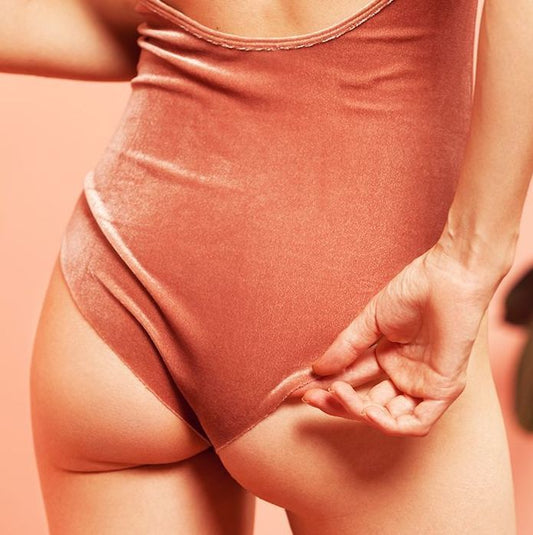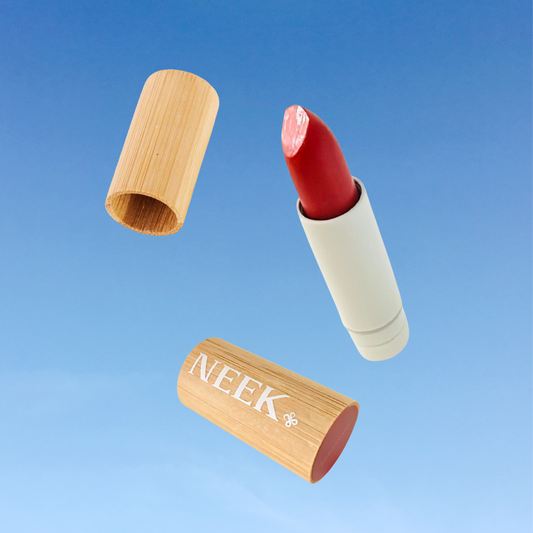The natural environment and things in our built environment like heaters and air-con dry out your skin, including your lips. Many lipsticks and lip balms, which contain mineral oils and other harsh ingredients, will also do the same. So, it’s no wonder our lips end up looking more prune than plum.
Like skin, your lips should be exfoliated and kept well moisturised to keep them supple, smooth and juicy looking. By regularly applying lip balm or lipstick containing natural hydrating ingredients, you will help attract water and retain moisture in your lips.
As a bonus, if your lips are well moisturised, you’ll notice that your lipstick will sit better on your lips!
1. Exfoliate
Once a week, gently exfoliate lips using a soft toothbrush or NEEK makeup remover mitt in a gentle circular motion to remove dead skin. Lips actually love it when you rub in a little olive oil or NEEK's Wide Lovely Face Serum on them at night after cleaning your teeth – honest. Ask them?
2. Cabinet Check
Not all beauty products for lips are created equal. Check the lip products in your bathroom cabinet.
Yes, please to these.
Lip balms and lipstick that contain natural oils and botanical ingredients like jojoba oil, avocado oil and shea butter, aloe vera sooth skin and help lips create a protection barrier.
And if, like us, you like your lips to be cruelty-free, avoid animal ingredients such as lanolin, beeswax, carmine.
No, thank you.
Sadly, many popular lip balms contain ingredients that lips really don’t like. They provide an immediate soothing sensation and smell delish but ultimately irritate the skin and, in some cases, may even destroy the outer layers of your lip skin. So confusing
3. Ingredients to avoid
-
Camphor
is a very toxic compound which can prove fatal for infants and children on ingestion even in very small doses. [1] It was or perhaps still is the main ingredient in Vicks Vaporub and one of the world’s most famous lip balms main ingredient is camphor.
Being addicted to Carmex and lip balm is a thing?!
Ingredients like camphor irritate the skin causing people to feel as though they need to reapply more frequently. “The irritation creates a never-ending cycle of Carmex addiction” says New York Dermatologist Dr. Whitney Bowe. [1]
-
Mineral oils and Petrolatum (broom, broom)
are derived from crude oil and dry out your lips.
-
Parabens
are a chemical and hormone disruptor that can pass through the skin barrier and into our bodies. Look out for basically any ingredient ending in -paraben.
-
Fragrance
is where nasty ingredients can be hidden under the guise of 'parfum’ or ‘fragrance’ sneaky much?
-
BHT
also known by other names like butyl-methylphenol, Butylhydroxytoluene. We see this one making more appearances lately. Exposure to BHT is toxic in mice and rats, causing liver, thyroid and kidney problems and affecting lung and blood function. [2]
4. Sun
If you’re applying sun cream to your face, make sure you pop some on your lips too. Lips protrude like our noses, so they’re a target for the sun. Or pop on a broad brimmed hat. Sun cream with high zinc levels are excellent for protecting lips.
5. Don’t lick your lips.
Licking your lips dries them out, so avoid tasty lip balms that makes your tongue lose control. In fact, a lot of the time, the tastier and creamier the lip balm, the more damaging the ingredients. Like Dr Bowe said above.
Repeated lip licking can even lead to a chronic condition known as lip licker's dermatitis.
Try this to kick the lick!
- Review the ingredients of your lip products (see ingredients to avoid above) these could be the culprit.
- Apply a natural lip balm several times during the day and especially before bedtime.
- Keep your lip balm handy - in your pocket, bag, car so it’s easily available.
- Drink plenty of water to help hydrate your lips and skin.
- Take a reusable water bottle wherever you go.
Lip licking habit should be kicked within 4 or so days.

Take out
Treat your lips like the rest of your face. Choose natural clean lip balms like NEEK Shine On Lip Balm. Protect them from the sun, keep them clean and moisturised. Drink lots of water and kiss regularly (optional but recommended).
[1] Goel A., Aggarwal P. Camphor—a lesser-known killer. South Med J. 2007;100:134. [PubMed] [Google Scholar]
[2] UNEP and OECD, 2,6-di-tert-butyl-p-cresol (BHT) Screening Information Data Set: Initial Assessment Report (Paris: OECD, 2002), http://www.inchem.org/documents/sids/sids/128370.pdf.
Do you have any additional lip care tips? We’d love to hear them. Share your lip care tips in the comments below so our lip-loving community can all benefit from your know-how.
Find this article helpful? Spread the love by sharing it on Facebook or Instagram. Just click the share button top left – easy!



